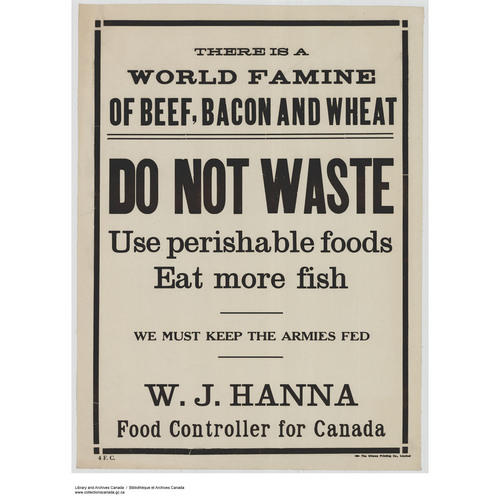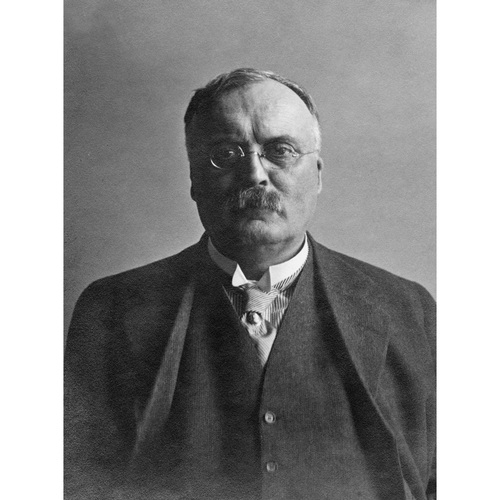![William John Hanna, president of Imperial Oil Limited, Guelph, Ontario. [ca. 1918-1919]. Image courtesy of Glenbow Museum, Calgary, Alberta. Glenbow Archives IP-26-8b-Hanna, W.J.-2. Original title: William John Hanna, president of Imperial Oil Limited, Guelph, Ontario. [ca. 1918-1919]. Image courtesy of Glenbow Museum, Calgary, Alberta. Glenbow Archives IP-26-8b-Hanna, W.J.-2.](/bioimages/w600.11455.jpg)
Source: Link
HANNA, WILLIAM JOHN, teacher, lawyer, politician, and office holder; b. 13 Oct. 1862 in Adelaide Township, Upper Canada, son of George Hanna and Jane Murdock; m. first 1 Jan. 1891 Jean Gibson Neil (d. 1895) in Point Edward, Ont., and they had at least one son; m. secondly 30 June 1896 Maud MacAdams in Sarnia, Ont., and they had two daughters; d. 20 March 1919 in Augusta, Ga.
Of Irish background, William J. Hanna spent his early years on his parents’ farm in Adelaide and then, after the family’s move in 1871, in Brooke Township in Lambton County. He graduated from Sarnia Collegiate Institute at 17 and for the next three years taught at a primary school near his home. Frustrated with teaching, he used his savings of $1,000 to finance his legal education at Osgoode Hall in Toronto. He was called to the bar in 1890 and settled into practice in Sarnia, where he became known for keeping actions out of court; in 1908 he would be appointed kc.
The hard-working Hanna soon came to the notice of the local Conservatives, who nominated him in the federal elections of 1896 and 1900. Defeated on both occasions, he was elected to the Ontario legislature in 1902 for Lambton West. According to party organizer Alexander Whyte Wright, his campaign had been “almost perfect.” A brilliant orator, the bespectacled Hanna “was not perhaps an orderly worker,” in the estimate of journalist John Stephen Willison*, “but at times he had almost a demoniac power of concentration.” His performance in opposition and his efforts in turning around the party’s fortunes in southwestern Ontario earned him the position of provincial secretary and registrar general when the Conservatives came to power under James Pliny Whitney in 1905. His new duties were apparently not expected to conflict with his legal and business interests.
While practising law and building his political base, Hanna had made many connections. He was counsel for the Imperial Oil Company Limited from the time it went to Sarnia in 1897, a director of the Imperial Bank of Canada, the Sterling Bank of Canada, and the Western Canada Settlers Mutual Company, and vice-president of International Petroleum and Empire Accident and Surety. Following his appointment in 1905, he continued to be a director of Imperial Oil. Some of his connections involved him in conventional patronage. Jacob Lewis Englehart*, for instance, a vice-president in Imperial Oil and president of the Conservative association in Lambton, was named in 1905 to the commission that directed the government-owned Temiskaming and Northern Ontario Railway and became its chairman the next year, reporting directly to Hanna.
Political critics attempted to corner him over his ties to business but he was able to keep the record clear of proven corruption. Resorting where necessary to rough partisan manoeuvring in parliament, he steered past charges in 1908 and 1913 of accepting campaign funds. In 1914 the Liberals asserted that his department, which had jurisdiction over liquor licensing, had used a licence inspector to defeat prohibition in votes in three counties. But again Hanna emerged untarnished.
When Whitney was winding down his political life in 1914, the Toronto Globe described Hanna as the “strongest man” in his cabinet. The premier, historian Charles W. Humphries claims, had come to count on Hanna’s “advice, inventiveness, and administrative ability,” but the Sarnia lawyer was deliberately overlooked as his successor. This oversight reflected divisions within the party – Hanna’s anti-hydro sentiments had led to a feud with power czar Adam Beck* – and perhaps its unwillingness to select a leader with such substantial business interests. Openly bitter, Hanna none the less continued as provincial secretary from October 1914 in the government of William Howard Hearst*. Hanna stepped down in December 1916, allegedly because of the pressure of business. Unstated factors may have included reaction to Imperial Oil’s relations with the hated Standard Oil trust, and Liberal attempts to smear Hanna for his shares in International Nickel, then under attack for its monopoly in Canada and alleged implication in wartime sales to Germany. Hanna remained part of the government as an mla and minister without portfolio.
As provincial secretary, Hanna had been responsible for the umbrella administration of public charities, prisons, asylums, health, child welfare, statistics, corporate registration, and liquor regulation. Early in politics he had voiced strong opposition in the legislature to Ontario’s system of prisons, which often released inmates in worsened psychological and physical shape. Under his guidance, in 1910 unskilled contract labour by prisoners was ended and a prison farm (the Ontario Reformatory) was established at Guelph with a range of shops for industrial training. Within the asylum system, he was no doubt aware of the progressive psychiatry being practised by such superintendents as Charles Kirk Clarke*. His own reformist impulse was evident in the establishment in 1912–13 of the hospital for the mentally disabled at Whitby, where inmates would be edged towards self-sufficiency through occupational therapy and other means. In addition, he promoted the work of such authorities as his friend Dr Helen MacMurchy*, whose studies of infant mortality and feeble-mindedness blended reform and eugenics. As minister for the Provincial Board of Health, he was instrumental in the appointment of district officers, the promotion of nurses’ training, and the stricter enforcement of pasteurization, vaccination, and sanitation during epidemics.
Hanna’s enormous capacity for legislative work was particularly apparent in his handling of the liquor question under both Whitney and Hearst. He was no prohibitionist, but by 1914 he had brought in nearly 40 changes to legislation for the purpose of restricting sales and distribution. In March 1916 he introduced the Ontario Temperance Act, which closed all bars, clubs, and liquor shops for the duration of World War I and prohibited sales except for medicinal, scientific, or sacramental purposes.
As early as 1908 Hanna had campaigned with federal Conservative leader Robert Laird Borden*, who became prime minister in 1911; during the war he was one of Borden’s advisers on coalition government and public policy. Frequently Hanna lent his weight directly to the war effort: he gave recruiting speeches throughout the province, and had the facilities of the Guelph reformatory used to help equip the Ontario Military Hospital in Orpington (London), England. (His sister-in-law Roberta Catherine MacAdams* was a nursing officer there in 1917 when she was elected to the Alberta legislature by the province’s soldiers overseas.)
When food shortages and inflationary prices appeared to threaten the war effort, Hanna was appointed food controller for Canada on 21 June 1917. With his usual single-mindedness, he interpreted his duty to be the maximization of production for overseas; though he exercised some regulatory authority, most of his work consisted of encouraging voluntary restraint and changes in eating habits. The public believed he should control domestic prices and the press found the whole program farcical, but Hanna refused to be swayed.
In ill health, he resigned from the controversial position on 24 Jan. 1918. His condition did not prevent him, however, from assuming later that year the presidency of Imperial Oil, which he would infuse with an air of progressive management. In December, for instance, he initiated collective bargaining and employee benefits.
A month earlier Hanna’s family life had been devastated by the accidental death in Italy of his son, William Neil, a lieutenant in the Royal Air Force. The shock, combined with his failing health, necessitated a trip to a warm climate for the winter. While in Augusta, Hanna suffered a stroke and died on 20 March 1919. Following a Methodist service, he was interred in Lakeview Cemetery in Sarnia.
AO, RG 80-5-0-187, no.5972; RG 80-5-0-235, no.6395: Lakeview Cemetery (Sarnia, Ont.), Burial records. NA, RG 31, C1, 1871, Adelaide Township, Ont., div.2: 26 (mfm. at AO). Daily Mail and Empire, 21 March 1919. Toronto Daily Star, 30 June 1917, 25 Nov. 1918. R. C. Brown, Robert Laird Borden, a biography (2v., Toronto, 1975–80), 2. R. C. Brown and Ramsay Cook, Canada, 1896–1921: a nation transformed (Toronto, 1974). Canadian annual rev. (Hopkins), 1903–19. Canadian men and women of the time (Morgan; 1912). CPG, 1909, 1919. Cyclopædia of Canadian biog. (Rose and Charlesworth), vol.3. C. W. Humphries, “Honest enough to be bold”: the life and times of Sir James Pliny Whitney (Toronto, 1985). Victor Lauriston, Lambton’s hundred years, 1849–1949 (Sarnia, [1949]), 256–57. Legislators and legislatures of Ont. (Forman). Nelles, Politics of development. Peter Oliver, G. Howard Ferguson: Ontario Tory (Toronto and Buffalo, N.Y., 1977). Ontario and the First World War, 1914–1918; a collection of documents, ed. and intro. B. M. Wilson (Toronto, 1977). Margaret Prang, N. W. Rowell, Ontario nationalist (Toronto and Buffalo, 1975). Standard dict. of Canadian biog. (Roberts and Tunnell). B. D. Tennyson, “Sir William Hearst and the Ontario Temperance Act,” OH, 55 (1963): 233–45; “The succession of William H. Hearst to the Ontario premiership – September 1914,” OH, 56 (1964): 185–89. Albert Tucker, Steam into wilderness: Ontario Northland Railway, 1902–1962 (Toronto, 1978). J. [S.] Willison, Reminiscences, political and personal (Toronto, 1919).
Cite This Article
Gayle M. Comeau, “HANNA, WILLIAM JOHN,” in Dictionary of Canadian Biography, vol. 14, University of Toronto/Université Laval, 2003–, accessed December 31, 2025, https://www.biographi.ca/en/bio/hanna_william_john_14E.html.
The citation above shows the format for footnotes and endnotes according to the Chicago manual of style (16th edition). Information to be used in other citation formats:
| Permalink: | https://www.biographi.ca/en/bio/hanna_william_john_14E.html |
| Author of Article: | Gayle M. Comeau |
| Title of Article: | HANNA, WILLIAM JOHN |
| Publication Name: | Dictionary of Canadian Biography, vol. 14 |
| Publisher: | University of Toronto/Université Laval |
| Year of publication: | 1998 |
| Year of revision: | 1998 |
| Access Date: | December 31, 2025 |




